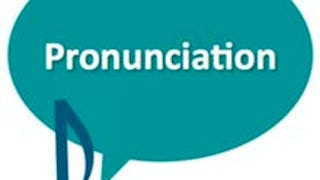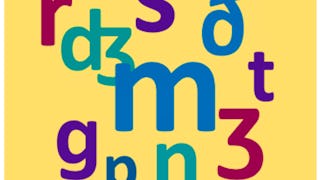In this course, you’ll practice the sounds of American English that might sometimes be confusing. You'll practice both consonant and vowel sounds. You’ll also learn about the things that give English its special “music,” such as how to stress the right syllable in a word, how to make your voice go up and down in a natural-sounding melody, and how to naturally connect sounds and words. Learning these things will help you speak more clearly and make sure that others can understand what you're saying.

Enjoy unlimited growth with a year of Coursera Plus for $199 (regularly $399). Save now.

Tricky American English Pronunciation



Instructors: Tamy Chapman
257,552 already enrolled
Included with
(2,332 reviews)
What you'll learn
Master challenging American English consonant sounds.
Accurately produce tricky American English vowel sounds.
Apply natural rhythm, stress, and intonation in spoken English.
Improve overall clarity and confidence in English communication.
Skills you'll gain
Details to know

Add to your LinkedIn profile
See how employees at top companies are mastering in-demand skills

There are 5 modules in this course
Welcome to this course on American English Pronunciation! In this introductory module, you'll get an overview of what we'll cover: mastering tricky consonant and vowel sounds, and understanding the rhythm of intonation and word stress. Our goal is to help you improve your pronunciation, making your spoken English clearer and easier for others to understand. Get ready to build confidence in your English communication skills!
What's included
2 videos1 peer review
In this module, you'll dive into the consonant sounds of American English. We'll start with a quick quiz to pinpoint your most challenging sounds. Then, you'll practice confusing sound pairs, learning tricks to differentiate them and understanding the precise mouth movements required. This foundational practice is key to building clear and confident English pronunciation. Get ready to master those tricky consonants!
What's included
9 videos8 readings4 assignments1 peer review
In this module, you'll master the tricky vowel sounds in American English. Building on your consonant practice, you'll discover why clear vowel production is crucial for being understood. Vowels are the 'heart' of every syllable, and mastering them is a vital step towards clear English pronunciation. Our goal is to help you speak English in a way that listeners easily understand in real-life conversations. Let's practice those essential vowel sounds!
What's included
9 videos7 readings4 assignments1 peer review
In this module, you'll discover the 'music' of American English, focusing on rhythm and melody. Building on individual sound practice, you'll explore syllables and word stress—how some parts of words are emphasized. We'll also cover weak forms, essential for understanding everyday spoken English. Our goal is to empower you to use English's natural flow to communicate more effectively and be easily understood. Enjoy mastering the rhythm of American English pronunciation!
What's included
11 videos8 readings4 assignments1 peer review
In this final module, you'll tackle advanced American English pronunciation challenges, building on your foundational skills. You'll learn to correctly pronounce '-s' and '-ed' word endings, crucial for grammatical accuracy. We'll also practice distinguishing tricky numbers (e.g., 14 vs. 40) and the subtle differences in 'can' and 'can't'. Finally, you'll master common sound changes in everyday speech like 'gonna' and 'wanna', helping you sound more natural and avoid misunderstandings in real-world English communication.
What's included
8 videos8 readings4 assignments1 peer review
Instructors


Offered by
Explore more from Learning English
 Status: Free Trial
Status: Free TrialUniversity of California, Irvine
 Status: Free Trial
Status: Free TrialUniversity of California, Irvine
 Status: Free Trial
Status: Free TrialUniversity of California, Irvine
 Status: Free Trial
Status: Free TrialUniversity of California, Irvine
Why people choose Coursera for their career




Learner reviews
2,332 reviews
- 5 stars
82.49%
- 4 stars
12.31%
- 3 stars
2.70%
- 2 stars
0.77%
- 1 star
1.71%
Showing 3 of 2332
Reviewed on May 1, 2020
This is something that I needed indeed to improve and enhance my English pronunciation due to not native teachers in my country to help me out with this specific matter, thanks.
Reviewed on Apr 26, 2020
the tutors were explained all subject clearly to us, non boring and easily understood. thankyou for helping us, i'm gonna practice more so i could improve my english pronounciation in the future.
Reviewed on Apr 21, 2020
They helped and taught me about American Englsih Pronunciation correctly which made me improves myself and encourage to speak out much more.Thank you so much for a good course from Coursera.
Frequently asked questions
You will need a computer, smart phone, or other recording device to record your voice in .mp3 format for graded assignments.
This course focuses specifically on American English pronunciation, covering consonant and vowel sounds, word stress, intonation, and natural speech rhythm to help you speak clearly and improve your English speaking skills.
This course is designed for English language learners with a foundational understanding of English who wish to refine their spoken American English and enhance their communication skills.
More questions
Financial aid available,
¹ Some assignments in this course are AI-graded. For these assignments, your data will be used in accordance with Coursera's Privacy Notice.





